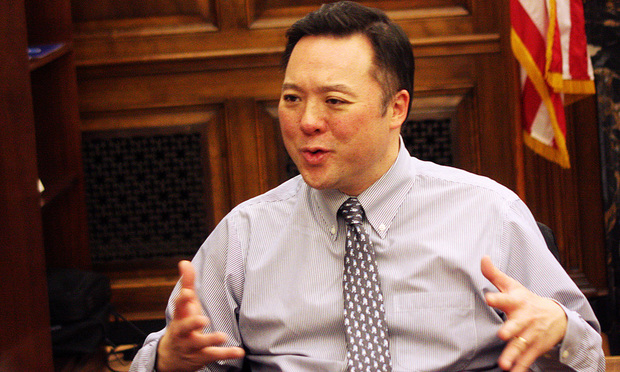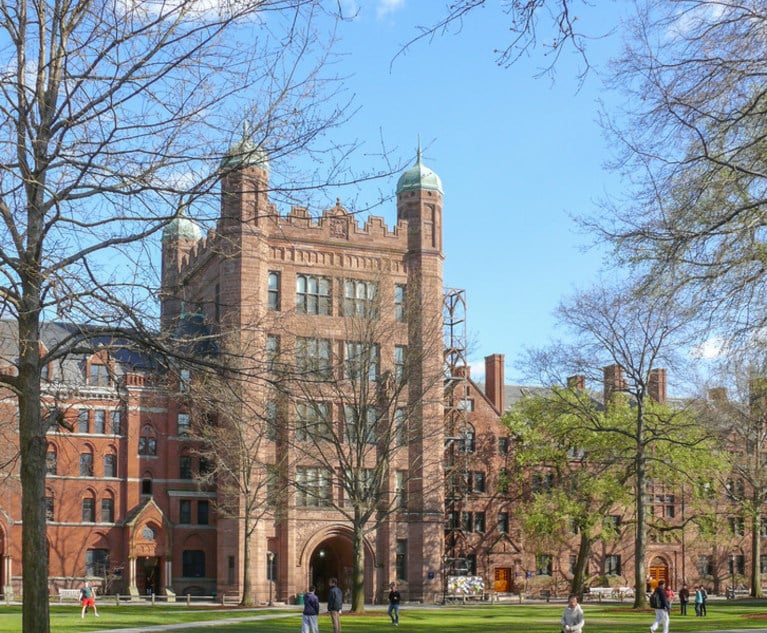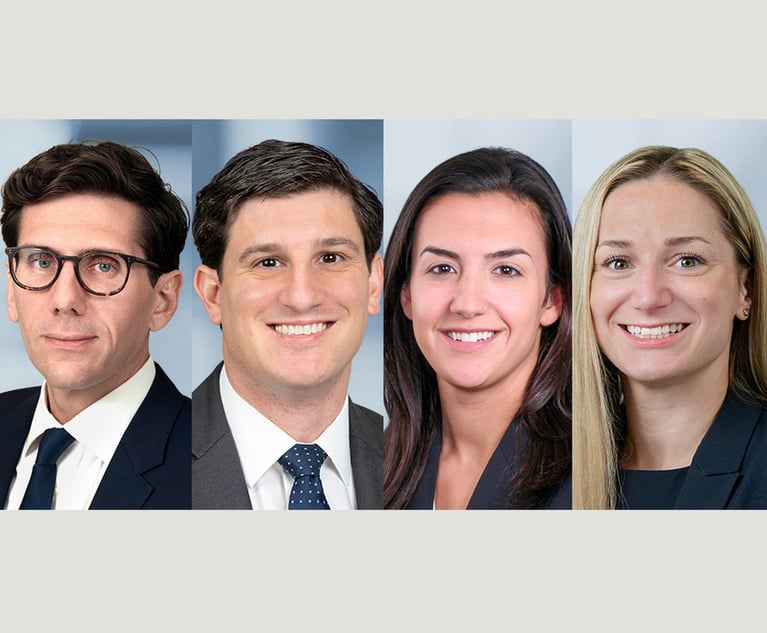Connecticut Attorney General William Tong Warns Against COVID-19 Scams
Connecticut Attorney General William Tong answered five questions related to COVID-19 that the Connecticut Law Tribune posed to him.
April 13, 2020 at 04:49 PM
5 minute read
 Connecticut Attorney General William Tong in February 2019. Photo: Michael Marciano/ALM
Connecticut Attorney General William Tong in February 2019. Photo: Michael Marciano/ALM
As most people seek ways to cope with the global COVID-19 outbreak, some are looking to take advantage of others.
That's the word from Connecticut Attorney General William Tong, who said the "buyer beware" adage is more important today than ever.
The scammers include callers who lie about representing charities, and others who try to steal identities by claiming Connecticut residents need to complete a census to get stimulus checks from the federal government.
Tong, a 46-year-old Stamford resident, sat down with the Connecticut Law Tribune to answer five COVID-19-related questions.
The answers have been edited for length and clarity.
Connecticut Law Tribune: You recently took part in a Zoom conference with Lt. Gov. Susan Bysiewicz on census scams. Trolls who made obscene and racist comments ended up invading that meeting. Because of COVID-19, many attorneys and others are taking to Zoom to conduct business. What was your reaction to those derogatory comments, and will your office be conducting any type of investigation into Zoom's practices?
William Tong: Lt. Gov. Bysiewicz and I were hosting a Zoom press conference on scams around the census and COVID-19 stimulus checks.
There are scammers out there right now claiming you need to complete your census form in order to get a stimulus check, which is just wrong. They are sending out links to fake websites to get access to people's personal information.
While we were trying to warn about this scam, our Zoom conference was bombed by hundreds of profane, vulgar and racist comments. This wasn't an isolated incident.
Along with several other states, my office has been speaking to Zoom about their privacy and security practices. We have requested information from the company, and so far they have been cooperative and responsive.
We've also been trying to get the word out to consumers about some of the best practices we all can deploy to stay safe online, including making sure you are using the highest security settings available, locking meetings once everyone invited as joined, and not sharing meeting links publicly online or elsewhere.
CLT: You recently discussed the do's and don'ts of charitable giving during COVID-19. Please elaborate on what people should look out for to avoid being a victim of a scam during these times?
Tong: Scammers see our desire to help one another during a crisis as an opportunity.
We see this reprehensible activity following natural disasters, terrorist attacks, and now with COVID-19. Before making any donation, please check the facts and make sure you are getting accurate information from a reputable source. My office put out guidance you can view here: https://portal.ct.gov/-/media/AG/Press_Releases/2019/Charitable-tips-(2).pdf?la=en.
One key thing you can do is check to make sure any organization you support is officially registered, by going to verified sources like the Connecticut Department of Consumer Protection, BBB Wise Give Alliance, Guidestar, or other sites listed in our guidance.
Also, don't fall prey to high-pressure tactics. If you receive a call or solicitation seeking a donation, take your time to get the facts.
CLT: For a long time, President Donald Trump was calling COVID-19 the "Chinese virus." Some still refer to it that way or as the "Wuhan virus." Since this virus became prevalent, there has been an increase in hate crimes against Chinese-Americans in this country. As the state's first Chinese-American attorney general, do you blame the president's rhetoric or the rhetoric of others for the increased number of hate crimes against that population?
Tong: This virus doesn't discriminate, and neither should we.
Terms like "Chinese virus" are racist dog whistles clearly intended to deflect blame and divide the country. We need our leaders to stop dividing and start uniting us toward a common goal: fighting this virus, saving lives, and getting our economy up and running again.
CLT: You recently sent out a release urging the Trump administration to ease restrictions to allow medical professionals to research solutions to the pandemic. Please elaborate on what research might come from this?
Tong: Scientists need every single tool available to find a vaccine and cure for COVID-19. For years, fetal tissue research contributed to major medical advancements. We need to lift this partisan impediment and let scientists get to work.
Scientists at the National Institute of Health working on potential COVID-19 therapies have been appealing to the president for permission to work on fetal tissue.
This kind of research has led to development of other vaccines for diseases like polio, rubella, and measles. The American Medical Association has also been asking for this ban to be lifted.
CLT: Last week, your office joined a coalition of 21 attorneys general urging the U.S. Department of Health and Human Services and its Centers for Medicare & Medicaid Services to reconsider their decision to deny a special enrollment period on HeathCare.Gov during the current pandemic. Why did you join this coalition and how does this effect Connecticut residents?
Tong: In Connecticut, we're fortunate that Access Health CT announced a special enrollment period through April 17 for qualified uninsured Connecticut residents.
But there are 38 states that don't run their own exchanges like we do, who rely on the federal exchange. No one should be without health insurance during a global pandemic, and many Americans still need help getting coverage.
Read more:
Q&A: AG William Tong Discusses Guns, Priorities, Management Style
NOT FOR REPRINT
© 2025 ALM Global, LLC, All Rights Reserved. Request academic re-use from www.copyright.com. All other uses, submit a request to [email protected]. For more information visit Asset & Logo Licensing.
You Might Like
View All


Discovery Seeks to Link Yale University to Doctor in Fertility Scandal
4 minute readTrending Stories
- 1California's Chief Justice Starts Third Year With Questions About Fires, Trump and AI
- 2Justin Baldoni Sues Blake Lively and Ryan Reynolds for $400M in New Step in 'It Ends With Us' Fight
- 3Top Leadership Changes Coming for NJ Attorney General's Office
- 4SCOTUSBlog Co-Founder Tom Goldstein Misused Law Firm Funds, According to Federal Indictment
- 5Patreon Hit With Lawsuit for Allegedly Diverting Subscriber Data to Meta
Who Got The Work
J. Brugh Lower of Gibbons has entered an appearance for industrial equipment supplier Devco Corporation in a pending trademark infringement lawsuit. The suit, accusing the defendant of selling knock-off Graco products, was filed Dec. 18 in New Jersey District Court by Rivkin Radler on behalf of Graco Inc. and Graco Minnesota. The case, assigned to U.S. District Judge Zahid N. Quraishi, is 3:24-cv-11294, Graco Inc. et al v. Devco Corporation.
Who Got The Work
Rebecca Maller-Stein and Kent A. Yalowitz of Arnold & Porter Kaye Scholer have entered their appearances for Hanaco Venture Capital and its executives, Lior Prosor and David Frankel, in a pending securities lawsuit. The action, filed on Dec. 24 in New York Southern District Court by Zell, Aron & Co. on behalf of Goldeneye Advisors, accuses the defendants of negligently and fraudulently managing the plaintiff's $1 million investment. The case, assigned to U.S. District Judge Vernon S. Broderick, is 1:24-cv-09918, Goldeneye Advisors, LLC v. Hanaco Venture Capital, Ltd. et al.
Who Got The Work
Attorneys from A&O Shearman has stepped in as defense counsel for Toronto-Dominion Bank and other defendants in a pending securities class action. The suit, filed Dec. 11 in New York Southern District Court by Bleichmar Fonti & Auld, accuses the defendants of concealing the bank's 'pervasive' deficiencies in regards to its compliance with the Bank Secrecy Act and the quality of its anti-money laundering controls. The case, assigned to U.S. District Judge Arun Subramanian, is 1:24-cv-09445, Gonzalez v. The Toronto-Dominion Bank et al.
Who Got The Work
Crown Castle International, a Pennsylvania company providing shared communications infrastructure, has turned to Luke D. Wolf of Gordon Rees Scully Mansukhani to fend off a pending breach-of-contract lawsuit. The court action, filed Nov. 25 in Michigan Eastern District Court by Hooper Hathaway PC on behalf of The Town Residences LLC, accuses Crown Castle of failing to transfer approximately $30,000 in utility payments from T-Mobile in breach of a roof-top lease and assignment agreement. The case, assigned to U.S. District Judge Susan K. Declercq, is 2:24-cv-13131, The Town Residences LLC v. T-Mobile US, Inc. et al.
Who Got The Work
Wilfred P. Coronato and Daniel M. Schwartz of McCarter & English have stepped in as defense counsel to Electrolux Home Products Inc. in a pending product liability lawsuit. The court action, filed Nov. 26 in New York Eastern District Court by Poulos Lopiccolo PC and Nagel Rice LLP on behalf of David Stern, alleges that the defendant's refrigerators’ drawers and shelving repeatedly break and fall apart within months after purchase. The case, assigned to U.S. District Judge Joan M. Azrack, is 2:24-cv-08204, Stern v. Electrolux Home Products, Inc.
Featured Firms
Law Offices of Gary Martin Hays & Associates, P.C.
(470) 294-1674
Law Offices of Mark E. Salomone
(857) 444-6468
Smith & Hassler
(713) 739-1250











